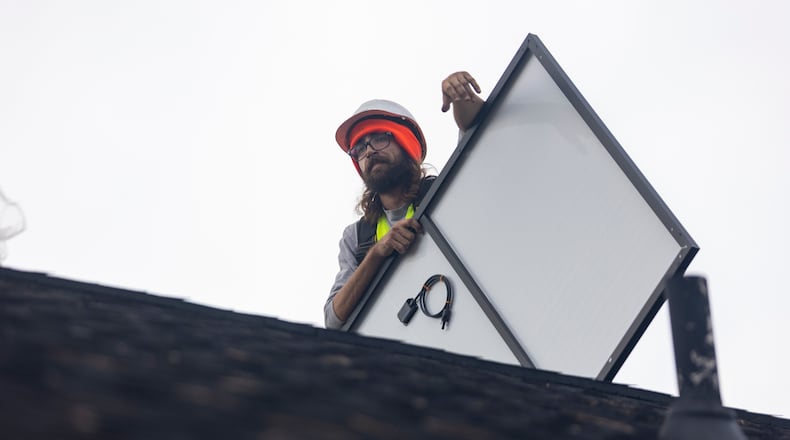A Georgia nonprofit that leases solar panels and battery storage to low-income homeowners has been awarded $156 million from the federal government to expand the program, the U.S. Environmental Protection Agency (EPA) announced Monday.
In total, the EPA announced $7 billion in “Solar for All” grants to 60 applicants across the country, part of a $27 billion pot aimed at reducing greenhouse gas emissions that was included in the 2022 Inflation Reduction Act.
For Georgia, where the program has been highly anticipated by clean energy advocates, the sole recipient was the Providence, Rhode Island-based Capital Good Fund, a nonprofit community development financial institution (CDFI) that operates in a handful of states.
“It’s absolutely transformational,” said Andy Posner, the fund’s founder.
The fund launched a pilot program, Georgia BRIGHT, with the cities of Atlanta, Decatur and Savannah last September that has so far signed up 34 homeowners making less than $100,000 a year.
The pilot has set a target of 200 participants. Posner said the $156 million grant will allow the organization to contract with about 20,000 Georgians over the next five years, and to do more free home improvements on houses that need work before they are ready for solar. That includes roof repair, one of the most common obstacles to installing solar on older homes.
Posner said the expanded program will save Georgians millions of dollars on their utility bills, make the electric grid more reliable, reduce greenhouse gas emissions and improve local air quality. The funding also includes money for outreach and job training.
“It’s good for economic development, for people, for climate, for health,” Posner said.
The state energy office, which falls under the Georgia Environmental Finance Authority (GEFA), was not successful in its application for $250 million from the same fund.
Kristofor Anderson, Georgia’s director of energy resources, congratulated the Capital Good Fund and said the authority stands “ready to collaborate where possible.”
Jennifer Whitfield, an attorney the Southern Environmental Law Center, which helped develop the pilot lease program, said in a statement it had “already created meaningful results for Georgia families facing disproportionately high energy bills.”
Advocates say Georgia has some of the highest energy burdens in the country, meaning that low-income families spend a greater portion of their income on power. Over the past year or so, customers of Georgia Power, a regulated monopoly and the largest power provider in the state, have seen a series of rate hikes. The utility recent won approval to increase its reliance on fossil fuels, and has resisted calls to adopt net metering policies to encourage rooftop solar.
Bryan Jacob, the solar program director for the Southern Alliance for Clean Energy, said solar leasing programs like the one in Georgia could be hugely beneficial, but much depends on the details of the program and the homeowner’s utility.
“The economics are influenced by who the utility is for that territory,” Jacob said. “Some utility offers are better than others, but it should provide a lot better access to solar for people that have historically not been able to afford it.”
While the Capital Good Fund was the only state-level recipient of Solar for All funding, Georgia is among the states included in a regional $156 million grant to Washington D.C.-based Groundswell Inc., a nonprofit focusing on community solar in rural areas.
A note of disclosure
This coverage is supported by a partnership with Green South Foundation and Journalism Funding Partners. You can learn more and support our climate reporting by donating at ajc.com/donate/climate/
About the Author
Keep Reading
The Latest
Featured




